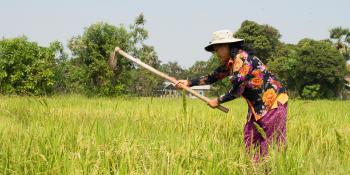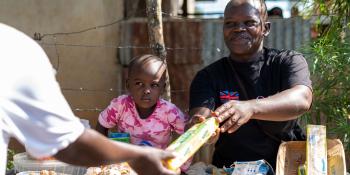
The effects of climate change means that cyclones are becoming more and more common in Bangladesh. The devastating effects of cyclones goes beyond the immediate destruction.
Extreme weather is causing the salinity of Bangladesh coastal waters to increase, which is destroying agricultural production. VSO volunteers support local women farmers to find sustainable solutions to these problems.
"I am proud of my business of organic manure and organically produced crops. I have no idea how much my business is supporting the environment, but I am sure my journey to support the environment will continue" says Sufia Khatun, age 35.
"I am experienced with so many cyclones such as SIDR (2007), AILA (2009), Mohsen (2013), Roanu (2016). Every time I saw the devastation of life and resources by the cyclone. I thought it is natural and there is no way to prevent cyclones. Now I know it is the cause and effect of global climate change. Smallholders like me are the most affected by cyclones such as loss of assets, crops, fertility of the soil by high salinity, and so on.
Every time I saw the devastation of life and resources by the cyclone. I thought it is natural and there is no way to prevent cyclones. Now I know it is the cause and effect of global climate change.
"I am a motivated entrepreneur supported by my fellow friends of Sankarkathi village of Shyamnagar Upazila. I am the founder president of Sankarkathi Prochesta Mohila Samity. It is registered by the Department of Women Affairs, Satkhiara. We received skill training by Government departments organized by Nakshikantha supported by VSO.
"The Government personnel taught us how to grow crops in climate-vulnerable areas where salinity is very high. My fellow women friends are keenly learn how to produce organic manure, organic pesticides, and how to use them in the crops. Government officials are visiting our village every month. Around 50 women farmers of my group are producing organic manure called vermin compost and used in crops. I am collecting vermin compost and organically produced crops from my fellows.
The awareness level of local people increases day by day because they have access to safe food.
"I processed and package the vermin compost and sell inside and outside of the village. The buyers of the vermin compost are the department of livestock, agriculture, cooperatives, UP chairman, and local farmers. I am earning 5-8 taka/kg from vermin compost and earning an average of 3000-4,000 BDT per month. Every day, I collect organically produced crops from fellow women farmers and send them to the sales center at Shyamnagar. One rickshaw van owner supports me to send crops to the sales center and earning monthly around 2,500 BDT.
"I am happy that high salinity is not a problem for us to grow vegetables and other crops. The market of organically produced crops is increasing regularly in the market and people have more interest in organic products and crops.
"The awareness level of local people increases day by day because they have access to safe food. Production and consumption of safe food reduced diseases such as hyperacidity, stomach upset, kidney disease, and so on. Local farmers and consumers learn the benefits from Agriculture officer and graduate doctor who facilitate training on the promotion of safe food organized by Nakshikantha supported by VSO.
"The everyday number of motivated producers and consumers is increasing. People are happy with organically produced fresh crops and it's a good test. Moreover, safe food ensures the healthy life of producers and consumers. I believe, it is a good journey of safe nature and it will never stop."

Right to food
Millions of people are struggling without a reliable source of food and income to support themselves and their families.

Women’s empowerment, control over incomes and right to food
Promoting women’s right to adequate food, women's control over their incomes and developing climate resilient agriculture.
